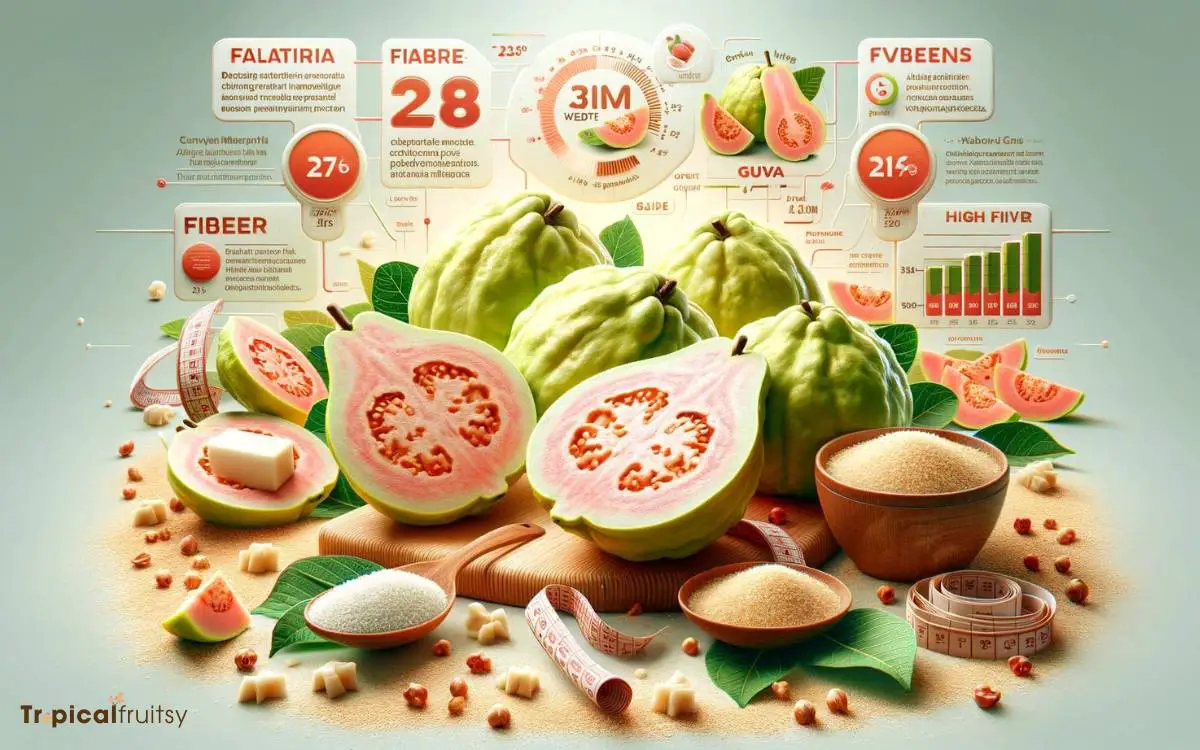Tropical Fruit That Helps You Lose Weight: Explained!
Tropical fruits are a delicious and effective addition to a weight loss diet. They are typically high in fiber, vitamins, and minerals while being low in calories.
Certain tropical fruits, such as papaya, grapefruit, pineapple, guava, coconut water, kiwi, and acai berries, have been recognized for their weight management properties.
These fruits support weight loss through various mechanisms, including improving digestion, boosting metabolism, and increasing satiety.
Tropical fruits facilitate weight loss in several ways:
Incorporate tropical fruits into your diet to enjoy their weight loss benefits and tantalizing flavors in a healthy way.

Key Takeaway
Tropical Fruits and Their Weight Loss Benefits
| Fruit | Key Nutrient/Benefit | Potential Weight Loss Mechanism |
|---|---|---|
| Papaya | Papain (enzyme) | Aids in digestion, may promote weight loss |
| Grapefruit | Low in calories | May influence fat metabolism |
| Pineapple | Bromelain (enzyme) | Enhances protein digestion, modest fat reduction |
| Guava | High in fiber | Increases satiety, reduces calorie intake |
| Coconut Water | Hydration | Low-calorie hydration option |
| Kiwi | Antioxidants | Nutrient density supports weight control |
| Acai Berries | Antioxidants | May help prevent cravings |
The Magic of Papaya

Papaya’s enzyme-rich composition positions it as an exceptional choice for individuals seeking natural weight loss solutions.
Central to its benefits is the enzyme papain, which aids in the digestion of proteins and can potentially lead to improved metabolic processes.
Dietary fiber found in papaya also contributes to a feeling of fullness, thereby reducing overall calorie intake. Moreover, papaya has a low-calorie count and high water content, which aligns well with weight management strategies.
It’s important to note, however, that while papaya can be part of a healthy weight loss diet, it should be complemented with a balanced diet and regular exercise.
As we continue to explore weight loss allies in the realm of fruit, let’s now shift our focus to grapefruit: a citrus powerhouse.
Grapefruit: A Citrus Powerhouse

Grapefruit, renowned for its tangy flavor and weight loss benefits, is rich in vitamin C and soluble fiber, which can help suppress appetite and regulate metabolism.
Studies indicate that compounds in grapefruit can enhance the body’s fat-burning abilities and improve insulin sensitivity, potentially aiding in weight management.
| Nutrient | Benefit | Grapefruit Content |
|---|---|---|
| Vitamin C | Boosts immune system | High |
| Soluble Fiber | Helps with satiety and digestion | Moderate |
| Antioxidants | Protects against free radicals | Ample |
Balancing consumption with a varied diet is important, as overindulging in grapefruit can interact with certain medications.
When enjoyed appropriately, its low glycemic index and caloric content make grapefruit an excellent choice for those looking to manage weight. Shifting focus, another tropical fruit, the pineapple, offers unique properties that influence metabolism.
Pineapple and Metabolism

Pineapple is renowned not only for its vibrant tropical flavor but also for its potential to aid in digestion and metabolism.
The fruit contains bromelain, an enzyme that may enhance the breakdown of proteins and play a role in increasing metabolic rate.
Current research is exploring bromelain’s capacity to support fat loss, although the extent of its effectiveness requires further investigation.
Pineapple Digestion Benefits
Enhancing digestive efficiency, the enzymes found in pineapple, particularly bromelain, have been shown to aid in metabolizing proteins, potentially supporting weight loss efforts.
Bromelain’s proteolytic nature means it breaks down protein molecules into their building blocks, such as amino acids and small peptides, which can then be more easily absorbed by the body.
Bromelain’s Digestive Advantages:
- Protein digestion: Simplifies the breakdown of complex proteins.
- Nutrient absorption: Enhances the body’s ability to absorb nutrients.
The facilitation of protein digestion by bromelain may lead to a more efficient metabolism, as the body expends energy to digest food.
This process, known as the thermic effect of food (TEF), contributes to the overall number of calories burned throughout the day, thereby aligning with strategies for weight management.
Boosting Metabolic Rate
Metabolic acceleration is another potential benefit of incorporating pineapple into a weight loss diet, as its components may increase the body’s energy expenditure.
Pineapple contains an enzyme called bromelain which not only aids in digestion but may also have a modest thermogenic effect, potentially boosting metabolism.
Moreover, pineapple’s fiber content can contribute to a feeling of fullness, potentially leading to reduced calorie intake.
| Nutrient | Benefit for Metabolism | Pineapple Content |
|---|---|---|
| Bromelain | Enhances protein digestion and may have thermogenic properties | High |
| Dietary Fiber | Promotes satiety, which may lead to lower calorie consumption | Moderate |
| Vitamin C | Supports various metabolic functions and fat oxidation | High |
The evidence suggests that while pineapple can be part of a balanced weight loss strategy, it should be consumed in moderation as part of a diverse diet.
Bromelain’s Fat-Burning Potential
Pineapple’s bromelain enzyme has garnered attention for its potential role in promoting lipid metabolism, which may aid in fat burning and weight loss efforts.
Bromelain’s Actions:
- Enhances the breakdown of fats by hydrolyzing triglycerides into glycerol and fatty acids.
- May boost overall metabolism through improved digestion and anti-inflammatory effects.
Evidence suggests that the systemic activity of bromelain might support weight management, yet its effectiveness is contingent upon overall lifestyle choices.
It is critical to note that bromelain’s impact on fat loss is not fully understood and should be considered as a complementary approach rather than a standalone solution.
Guava for Fiber

Guava’s high fiber content makes it an excellent choice for those seeking to incorporate weight-loss-friendly fruits into their diet.
This tropical fruit is not only rich in vitamins and antioxidants but also boasts an impressive amount of dietary fiber, which is crucial for maintaining a healthy digestive system.
Fiber plays a significant role in weight management by promoting a feeling of fullness after meals, reducing the likelihood of overeating. Studies have indicated that a diet high in fiber is associated with lower body weight.
Guava’s fiber content helps regulate blood sugar levels as well, which can curb cravings and erratic eating patterns.
Including guava in a balanced diet can be a strategic move for those targeting weight loss through natural, nutritious food choices.
Coconut Water Benefits

Coconut water, often referred to as nature’s sports drink, offers a myriad of health benefits. It aids in weight loss by providing a low-calorie hydration option that is rich in electrolytes and minerals.
Hydration and Nutrients:
- Low in Calories: Ideal for a weight-loss diet, as it is a much healthier alternative to sugary drinks.
- Rich in Electrolytes: Contains potassium, magnesium, sodium, and calcium, which are crucial for maintaining proper fluid balance in the body.
- Supports Weight Loss:
- Appetite Control: The high potassium content helps regulate sodium levels and might curb cravings.
- Improved Metabolism: Contains bioactive enzymes that can aid digestion and boost metabolism.
This naturally sweet, low-fat beverage is not only refreshing but also provides essential nutrients that support overall health and weight management efforts.
Kiwi: Nutrient Density

Kiwi fruit, known for its exceptional vitamin C content and dietary fiber, is another nutrient-dense option for those pursuing weight loss goals.
A single medium-sized kiwi contains about 42 calories and provides a rich array of vitamins and minerals that are essential for a healthy metabolism and immune system.
The high fiber content not only aids digestion but also helps in creating a sense of fullness, reducing the likelihood of overeating.
| Nutrient | Benefit |
|---|---|
| Vitamin C | Supports immune function |
| Fiber | Enhances satiety and digestion |
| Potassium | Regulates blood pressure |
Incorporating kiwi into a balanced diet can contribute to weight loss by providing necessary nutrients without a high calorie count. Its low glycemic index also makes it suitable for those monitoring their blood sugar levels.
Can Certain Tropical Fruits Have Negative Effects on Weight Loss?
While tropical fruits are generally considered healthy, some may have negative effects on weight loss if consumed in large quantities. However, no scientific evidence suggests a direct link between tropical fruits and miscarriage. It’s important to enjoy them in moderation as part of a balanced diet for optimal results.
Acai Berries for Antioxidants

While acai berries are renowned for their weight loss benefits, they are particularly valued for their high antioxidant content, which plays a crucial role in combating oxidative stress and supporting overall health.
Acai berries contain anthocyanins and flavonoids, two types of antioxidants that have been studied for their potential to neutralize harmful free radicals.
Antioxidant Benefits of Acai Berries:
- Combat Oxidative Stress: They help to reduce the damage caused by excessive free radicals, which are linked to chronic diseases and aging.
- Promote Heart Health: The antioxidants may lower the risk of heart disease by improving cholesterol levels and reducing oxidation of LDL (bad) cholesterol.
Incorporating acai berries into a balanced diet can contribute to an antioxidant-rich lifestyle, supporting both weight management and overall health.
Conclusion
The tropical fruits discussed herein not only tantalize the palate with their distinct flavors but also contribute significantly to weight management.
Papayas, grapefruits, and pineapples are linked to metabolic enhancements, while guava and kiwi are lauded for their high fiber content and nutrient density, respectively.
Coconut water offers hydration with minimal caloric intake, and acai berries boast potent antioxidants.
Future research may further elucidate the complex roles these fruits play in supporting a healthy weight.






